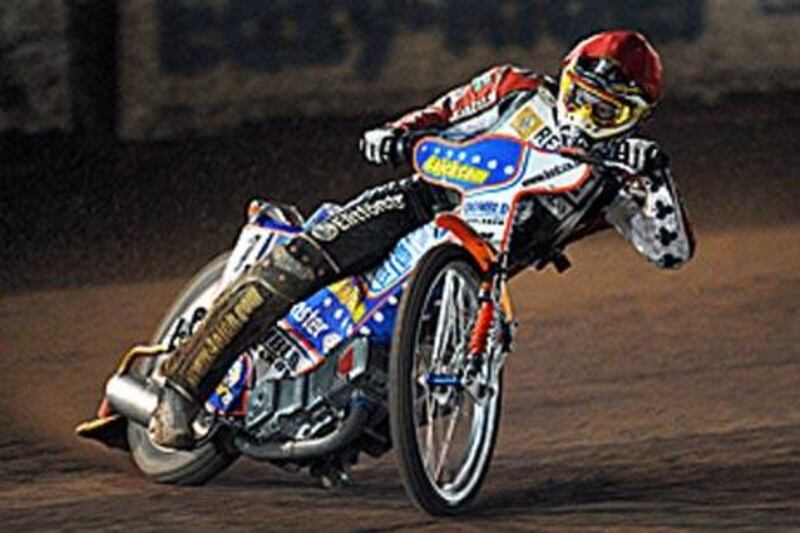Speedway was once the most popular summer sport in Britain but despite the whiff of methanol fumes and the noise of revving 500cc engines it is now in decline The first time I saw a speedway rider, he looked like a spaceman to my seven-year-old eyes: the shiny black suit, the curious helmet and ungainly moonwalk gait (just try looking elegant in a pair of heavy boots, one of which has a two-inch steel plate attached to the sole to protect the left foot when sliding round corners.) By the time I reached my teens, though, I was hooked. American kids of the Sixties had Willie Mays and Johnny Unitas to hero worship; I had Charlie Monk of the Glasgow Tigers, surely the greatest rider never to win the world championship.
It may be four decades and more ago, but I can still hear the snarl of the bikes, the thunderous roars from the packed terraces of the White City and that intoxicating whiff of methanol fumes on the cinders the night my Australian idol pipped the world champion Barry Briggs, of the Swindon Robins, on the line after a wheel-to-wheel duel that made the car chase in the Robert de Niro movie classic Ronin look like a family Sunday outing.
Though I had a vague notion girls might offer an interesting alternative in the years ahead, it was the most exciting 60-odd seconds of my early years. Although Saturday's Scandinavian GP in Malilla, Sweden drew a capacity 15,000 attendance, speedway, alas, is in decline in Britain, where it was overwhelmingly once the most popular summer sport. In the good old days of the post-War era, speedway attracted an aggregate 12.5million spectators and when 1949 World Final tickets at Wembley went on sale, more than 500,000 frenzied fans applied for the 85,000 places available.
London boasted five First Division tracks at Wimbledon, West Ham, Wembley, Harringey and New Cross. Sixty years on, not one remains. Such was speedway's popularity that they even made a movie about it, the 1948 less-than-epic Once A Jolly Swagman starring Dirk Bogarde as a hard-bitten Aussie dirt-track rider. The action scenes were shot at New Cross Stadium in the Old Kent Road, and when the Rangers' crowded schedule of home fixtures began to interfere with filming, the makers built an exact replica of the track, complete with pits, on a back-lot at Pinewood Studios.
Once A Jolly Swagman did not win any Oscar nominations, but it did succeed in keeping speedway fans occupied through the dark winter nights. Ask any speedway fan or rider what makes his sport unique and chances are they will take a deep sniff and reply, "the smell". Last week I watched 4,000 spectators file into the Wimborne Road Stadium which serves as home to the Poole Pirates (the Manchester United of cinders), each and every one passing through the gates to draw in a huge lungful of sport's most habit-forming aroma.
"Wonderful, isn't it?" smiled the Belle Vue Aces' ace, Jason Crump, as he pleasurably sniffed his way around the pits. The 34-year-old Australian has been filling his nostrils with the stuff for two decades and more - his dad, Phil, was third in the 1976 world championship - but was as excited as any seven-year-old in the packed grandstand to be pulling on his leathers again to the accompanying symphonic roar of revving 500cc engines before making his debut on his return to the Aces.
Crump Jr was raised on the Gold Coast south of Brisbane where, like any young Aussie of his generation, his earliest sporting hero was Allan Border. "But I never wanted to play Test cricket, all I ever dreamed of doing was riding a speedway bike." Twice world champion, Crump moved within touching distance of a third title when he finished runner-up to Poland's Tomas Gollob in Malilla over the weekend, thereby extending his lead in this year's race for the crown. "It would have been nice to play in the Ashes," he said, "but cinders will do for me."
Coming across Earnie Shavers working as a nightclub bouncer in Liverpool (or "meeter and greeter" to use his preferred job description) at a time when there are 2.38 million unemployed in Britain, you feel like saying: "Well done. But what on earth are you doing here?" Shavers, who also serves thelocal community as a preacher, was recognised as the greatest heavyweight puncher of the 20th century: a more brutal hitter than Rocky Marciano, Sonny Liston or Mike Tyson. As a child he had to flee the farm on which he grew up in Alabama after his family were victimised by the Ku Klux Klan, to grow into the hardest man in heavyweight's hard-man days of the Seventies, when he lost a brutal 15-round world title fight against Muhammad Ali and floored Larry Holmesbefore being stopped in the 11th, a bout that still sends shivers down those who sat at ringside. As Randall "Tex" Cobb, whose verbal uppercuts always carried more weight than has fists, put it: "If anybody had hit harder than Shavers, I'd have shot him." James "Quick" Tillis recalled his encounter with Shavers thus: "He hit me, man, and knocked me face down on the canvas. I was in the land of make-believe; I heard saxophones and trombones. I saw little blue rats running around the ring and they were smoking ceegars and drinkin' whiskey." As a man of God, Shavers offers no apology for the brutality of his boxing philosophy. "There was excitement when I fought because I was a hitter and that's what the fans really want to see - a guy getting his block knocked off. It sounds bad, but that's what it's all about..." rphilip@thenational.ae





